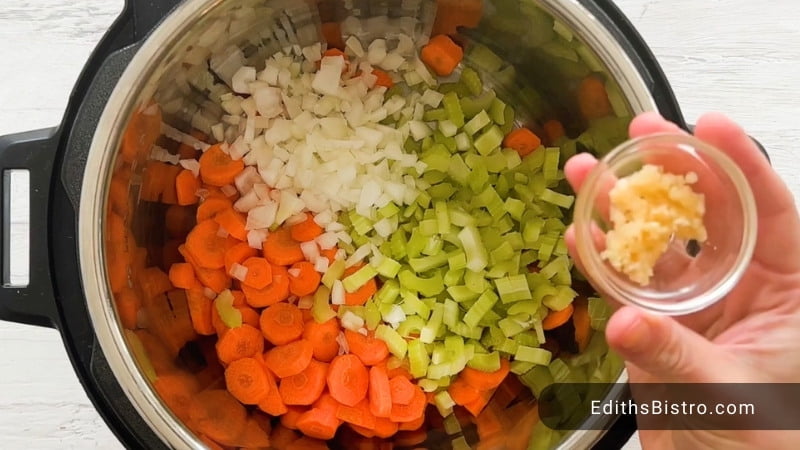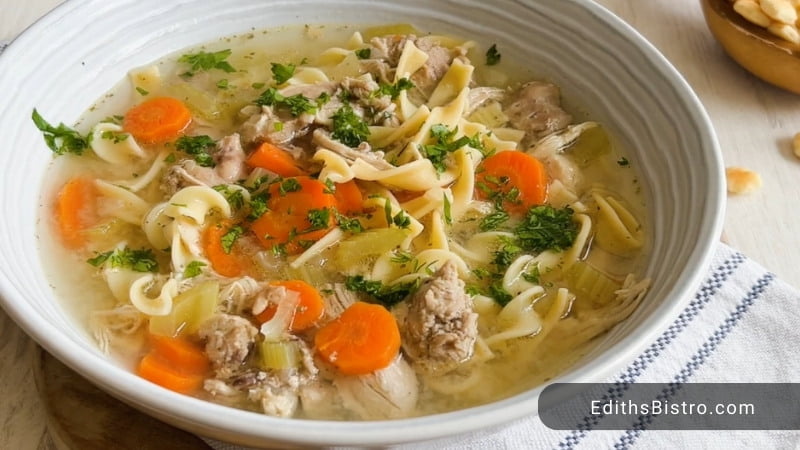Chicken Noodle Soup, a staple comfort food known globally, is valued not just for its delicious taste but also for its nutritional benefits. Preservation of this cherished dish is often a topic of interest for many. So, can you freeze chicken noodle soup? This guide will navigate you through the right process to retain its flavorful essence.
Can You Freeze Chicken Noodle Soup?
Certainly! By using proper freezing techniques, the integrity, flavor, and nutritional value of the soup can be preserved perfectly. This method is practical for effectively managing leftovers, reducing food waste, and providing a quick and nutritious meal option on busy days, allowing the enjoyment of the soup’s comforting and hearty goodness anytime it’s desired.
The Right Way To Prepare Chicken Noodle Soup For Freezing
Choosing Ingredients Wisely

Preparing chicken noodle soup correctly for freezing starts with choosing fresh, high-quality ingredients and durable pasta like whole wheat or egg noodles. They are known to withstand the freezing and reheating processes well. Cooking the noodles al dente, meaning they are still firm when bitten, is crucial to prevent them from becoming mushy during reheating. Selecting the right type of noodles and cooking them correctly can help in maintaining the soup’s texture, taste, and overall quality, ensuring that every reheated bowl is as comforting and enjoyable as when it was freshly made, allowing the preservation of that homemade deliciousness even after freezing and reheating.
Packaging Chicken Noodle Soup For The Freeze
When it comes to freezing chicken noodle soup, picking the correct packaging is super important to keep the soup from getting freezer-burned and maintain its quality. Freezer burn can make the soup taste off and change the texture. To avoid this, you should use freezer-suitable containers that are airtight when storing chicken noodle soup, like sturdy plastic containers or bags that can be vacuum-sealed. This keeps the air out and helps maintain the quality and flavor of the soup.
Step-by-Step Guide to Freezing Chicken Noodle Soup
- Let the soup cool: After cooking the chicken noodle soup, allow it to cool completely at room temperature. Cooling is crucial, as it preserves the texture and flavor of the ingredients.
- Portion the soup: Divide the soup into individual servings. This way, you can thaw only what you need, reducing waste and maintaining freshness.
- Choose the Right Containers: Opt for airtight, containers or heavy-duty freezer bags. These protect the soup from freezer burn and help maintain its quality over time.
- Leave Some Space: When pouring the soup into containers or bags, leave about an inch of space at the top. This allows the soup to expand as it freezes without causing the container to crack or the bag to burst.
- Label Clearly: Mark each container or bag with the freezing date. This helps in keeping track of the soup’s freshness, ensuring consumption within the optimal period, ideally within three months.
- Arrange in the Freezer: Place the containers or bags in a single layer in the freezer, ensuring they are upright to prevent any leakage. Once the soup is solid, you can rearrange it as needed to optimize freezer space.
Thawing and Reheating Your Frozen Chicken Noodle Soup

Proper Thawing Methods
When dealing with frozen chicken noodle soup, it is crucial to thaw it properly to maintain its flavor, texture, and quality. Here are two effective methods to thaw your soup:
- Fridge Method: Place the frozen soup in the fridge and let it thaw overnight. This is the best way, but it takes longer. Once thawed, consume the soup within 3-4 days for best quality.
- Microwave Method: Use the defrost setting on your microwave if you are short on time. Defrost according to your microwave’s instructions, generally stirring every couple of minutes to ensure even thawing. But remember, you should cook it immediately after thawing it in the microwave.
Best Practices for Reheating
- Reheat your chicken noodle soup slowly on the stove using low heat or in the microwave.
- Stirring now and then to evenly heat the soup.
- Avoid letting the soup boil to keep the noodles from getting too soft.
- Always make sure the soup reaches a temperature of 165°F before you eat it, and consume it promptly after reheating to enjoy its best quality.
- Once reheated, consume the soup promptly. If you have leftovers, avoid reheating them multiple times, as it will continue to degrade the soup’s quality.
FAQs
How long does chicken noodle soup last in the freezer?
Chicken noodle soup can last in the freezer for approximately 2 to 3 months while maintaining its best quality in terms of flavor, texture, and nutritional value. However, it is still able to eat indefinitely beyond this time frame, as long as it has been stored properly and kept at a consistent temperature of 0°F (-18°C) or lower, but there might be a gradual decline in its taste and texture.
Can you freeze-dry chicken noodle soup?
Yes, you can freeze-dry chicken noodle soup. Freeze-drying removes the moisture content, preserving the soup’s flavor and nutritional value while making it lightweight and shelf-stable. When ready to eat, just add hot water. However, be mindful that the texture of some components, like noodles, might alter post freeze-drying and rehydrating.
Can you freeze chicken noodle soup in mason jars?
Yes, chicken noodle soup can be frozen in mason jars, but there are precautions to avoid breakage. Only use straight-sided or wide-mouth jars, as they are less prone to cracking. Leave adequate headspace (about 1-2 inches) at the top of the jar to allow for the soup’s expansion as it freezes. Cool the soup completely before freezing, and avoid over-tightening the lids. Also, freeze the jars at a slight angle to avoid breakage.
References:






![What To Pair With Quiche? 25+ Best Dishes [With Pictures]](https://www.edithsbistro.com/wp-content/uploads/2024/04/what-to-pair-with-quiche-160x90.jpg)
